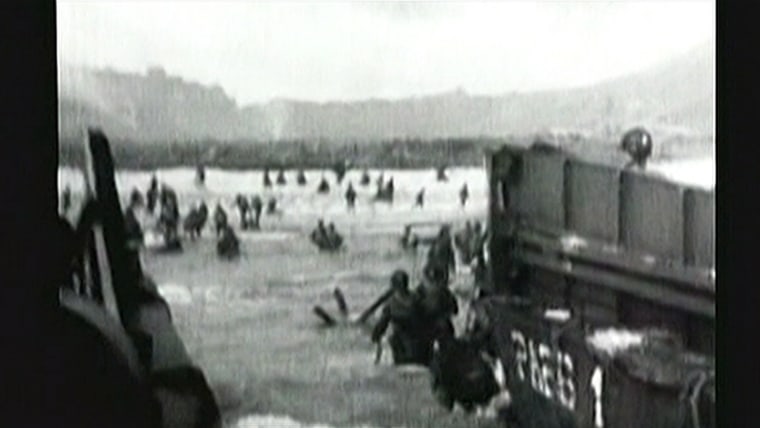LONDON — On the beaches where 160,000 Allied troops landed on the shores of Normandy on June 6, 1944, the invasion known as D-Day, a new battle is brewing.
A group of French veterans and their descendants is campaigning against a planned $58 million “immersive” history experience. Set in an 800-seat theater that would move between sets, the show, titled “Homage to Heroes,” would incorporate live actors and archival footage.
The organizers behind the project estimate that it could attract as many as 600,000 tourists a year and plan for it to open in time for the 80th anniversary of D-Day in 2024.
“We asked ourselves, ‘How can we make some sort of legacy for our kids first to remember what happened in Normandy during World War Two?’ Today you can find movies, TV shows and books about the war, but there is no show telling the story of these men,” said Roberto Ciurleo, one of three co-producers on the project.
“Homage to Heroes” will bring together the masses of archival material available from the war and use “new tools to reach out to the younger generation in a language they understand,” Ciurleo said.
But a French veteran who fought in Normandy say the theater experience would be disrespectful to those who fought and died there.
“The war is not a show. It’s history, and you must respect people who gave their life for freedom,” said Leon Gautier, 98, a former French marine with the Kieffer commandos who fought with the British on D-Day.
“They want money for history, and we don’t agree to that,” he said.
Gautier met with the organizers of the project last month to hear their plans and said they did little to assuage his worries.
He added his name to a letter published in the newspaper Le Monde on Sept. 9 by a group of concerned veterans and their families. The group has since sent letters to local politicians, including the president of the Normandy region, Hervé Morin, who has indicated that he is in favor of the project.
With little to show for their efforts at the moment, the group has now involved at least one American veterans’ association, and it is trying to drum up support for its campaign among other associations tied to D-Day veterans.
The National 4th Infantry Division Association sent a letter of opposition to the project on Thursday, saying it is “appalling” that “anyone would consider turning the sacred grounds of Normandy into a profit focused amusement park.”
Bob Backcock, the association’s historian and former president, said veterans feared that Normandy “will go from being a place of historic reverence to a place like Disney.”
On D-Day, Allied forces landed on five beaches in Normandy to advance into France — including 23,000 men from the 4th Infantry Division who landed on Utah Beach. Nearly 9,000 soldiers from the division were killed in the fighting in June and July.
Organizers of the project say building an amusement park is far from their goal.
“There was no intention and there is still no intention to have a lack of respect, to do entertainment, to do a fun park about the landing,” said theater director Serge Denoncourt, who is writing the show.
“We want to open a door for kids and teens to say, ‘I didn’t know all that, and I want to go to Omaha Beach and Colleville,'” he said.
Denoncourt, who previously directed a Cirque du Soleil show in Las Vegas, as well as other productions in the U.S., Canada and Europe, said the outrage has shocked him given that he has yet to have even begun writing.
He estimates it will take another two years to complete the project, which is backed by private money. He said he is speaking with experts to ensure historical accuracy and has offered to meet with the opposition group to fully explain the plans in a bid to win it over.
“The idea is really good, so I don’t want to put it in the trash. We can go anywhere in the world,” Denoncourt said.
The organizers have yet to choose a location, and Ciurleo said three towns in the Normandy region, including Bayeux and Carentan, have expressed interest in hosting the memorial experience.
Despite the fierce opposition, local historians are open to learning about the planned history experience.
“When someone says we want to suggest a project in Normandy to explain what happened with new technology, the question isn’t to say I disagree. It is to hear their opinions, what do they want to do, what is their idea,” said Stéphane Grimaldi, the director of three museums and memorials in Normandy: the Caen Memorial Museum, Arromanches 360 cinema experience, a circular cinema that tells the story of D-Day, and the Falaise Memorial.
Grimaldi met with the organizers of the show and has agreed to serve as an adviser. However, he would also like the region to analyze the need for a new memorial so it can better understand the impact it would have on visitor numbers to Normandy’s existing museums and memorials.
“Maybe they will succeed to help young people from the ages of zero to 40 understand what happened and why it happened and what are the consequences,” he said.












